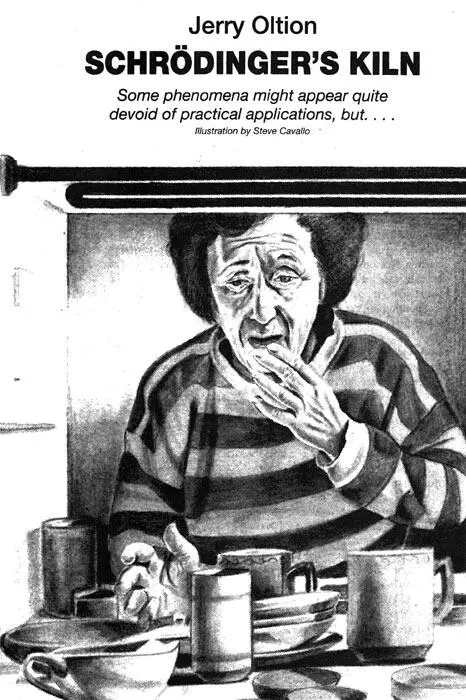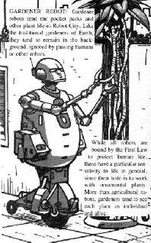Jerry Oltion - Schrödinger's Kiln
Здесь есть возможность читать онлайн «Jerry Oltion - Schrödinger's Kiln» весь текст электронной книги совершенно бесплатно (целиком полную версию без сокращений). В некоторых случаях можно слушать аудио, скачать через торрент в формате fb2 и присутствует краткое содержание. Год выпуска: 1995, Издательство: Dell Magazines, Жанр: Фантастика и фэнтези, на английском языке. Описание произведения, (предисловие) а так же отзывы посетителей доступны на портале библиотеки ЛибКат.
- Название:Schrödinger's Kiln
- Автор:
- Издательство:Dell Magazines
- Жанр:
- Год:1995
- ISBN:нет данных
- Рейтинг книги:3 / 5. Голосов: 1
-
Избранное:Добавить в избранное
- Отзывы:
-
Ваша оценка:
- 60
- 1
- 2
- 3
- 4
- 5
Schrödinger's Kiln: краткое содержание, описание и аннотация
Предлагаем к чтению аннотацию, описание, краткое содержание или предисловие (зависит от того, что написал сам автор книги «Schrödinger's Kiln»). Если вы не нашли необходимую информацию о книге — напишите в комментариях, мы постараемся отыскать её.
Schrödinger's Kiln — читать онлайн бесплатно полную книгу (весь текст) целиком
Ниже представлен текст книги, разбитый по страницам. Система сохранения места последней прочитанной страницы, позволяет с удобством читать онлайн бесплатно книгу «Schrödinger's Kiln», без необходимости каждый раз заново искать на чём Вы остановились. Поставьте закладку, и сможете в любой момент перейти на страницу, на которой закончили чтение.
Интервал:
Закладка:
Jerry Oltion
Schrödinger’s Kiln

Illustration by Steve Cavallo
When her finger caught in the smooth wall of red clay and the nearly finished stoneware mug ripped apart like a house under a tornado, Mary simply lifted her hands from the wreckage and watched it spin around and around atop the wheel’s muddy disk. She didn’t get angry. She was way past angry. This was the fifth mug she’d ruined today, and she’d used up all her mad after the second. All the same, it was more than simple fatigue that made her hands shake now. That was her livelihood spinning around on display before her.
She fumbled with her left foot for the power switch, finally kicking it with her big toe. The lump of clay coasted to a stop, and now that the electric motor’s whine and rumble had quit, the only sound in the studio was the classical music coming from the radio on the drying table beside the wheel.
The table with only two mugs on it, where there should have been eight.
And of those two, only one was new today. The other had already been glazed and fired. Mary picked it up without bothering to clean the mud off her hands and tilted it to her lips.
Gah. Cold coffee.
Leaving the ruined mug on the wheel, she stood and carried the halffull one through the clutter of packing boxes and clay sacks into the kitchen, where she opened the microwave oven—and stopped. There was already another mug sitting on the glass dish.
Lord, she thought, how long has that been there? Since yesterday, at least, because she only used one mug a day. She took the old one out and replaced it with the new one, then closed the door and pushed the one-minute button. Her finger twitched and she got two minutes instead, but the light came on and the carousel began revolving slowly while the microwaves did their thing. Mary turned to the sink and washed out the old mug while she waited for the coffee to heat.
There was no denying it any more, she was falling apart. Age and arthritis had made her hands unsteady, and now her memory was failing, too. Pretty soon it wouldn’t matter how many mugs she could make in a day, because she wouldn’t be able to remember who had ordered them.
At least she hadn’t started collecting cats, the way so many old women did.
She looked back into the studio—which used to be the dining room until she’d grown tired of carrying clay up and down from the basement—at the mess on the wheel. The lack of cats was little comfort when she couldn’t even fill a simple order for a set of mugs. For that matter, the wheel itself was a constant reminder of her decline. She’d always hated electric wheels, hated them with the artist’s disdain for mechanization, but her legs could no longer push a foot-wheel all day.
The microwave beeped softly, but the coffee aroma leaking out around the door drew Mary’s attention even more. She’d overdone it. The coffee had boiled. Sure enough, when she opened the door, there sat the mug in a puddle of foamy brown stickiness. Sighing she lifted it out by the still-cool handle—amazed as always at how the oven could heat the coffee but not the cup—then drained it into the sink and washed out this mug, too. To hell with coffee; she didn’t need any more caffeine making her shake, anyway.
There wasn’t room in the rack for the second mug. Puzzled, Mary turned around with it still in her hands, scanning the pottery-filled shelves that lined the studio walls. Had she taken it from one of the finished orders? No, each set was complete, plates and saucers and mugs stacked neatly in rows, waiting for customers to pick them up or for Mary to mail them out. She wondered if she’d accidentally shorted someone when she’d packed an order. Must have, she supposed, carrying the extra mug across the room to set it in a gap on the shelves. No telling which order; all her mugs were the same nowadays. Her trademark design hadn’t changed in years.
Well, whoever it belonged to would no doubt call to complain when they unpacked the box. Disgusted with herself, Mary went outside to stand for a moment in the back yard and take a breath of fresh air. Late evening light filtered through the apple tree next to the house, and the breeze carried the scent of its blossoms. Ah, yes, that felt good. Maybe a walk would help calm her down even more.
She didn’t exactly get lost. Disoriented was more the word for it. The neighborhood had changed so over the years, none of the landmarks she remembered were the same anymore. She knew she would eventually find her way home, though, and she did, if a bit later than she’d expected. The Sun was already down by the time she spotted her familiar white house with its daffodils lining the walk. Tired, and a little bit scared, she switched out the lights in the studio and went straight to bed.
She had to chisel the ruined mug off the wheel in the morning. She should have done it last night, but she’d been preoccupied and she’d forgotten. Determined to do better today, she set straight to work on the mugs, and she finished two in a row before her hands grew tired and she ruined the third. She’d been expecting that, so she switched tactics, making a few of the easier plates and bowls so she wouldn’t have to do all the difficult work at once. It seemed to help, though she ruined a few of those, too.
Over the next few days she did manage to finish a few complete dining sets, but only by working late into the night. By the end of the week she was exhausted, yet when she compared her output against the incoming orders, she realized she hadn’t even come close to keeping up with the demand. Nor even to making a living. At this rate she would barely be able to pay her light bill.
She sat at her shipping desk, rubbing her eyes and staring at the clutter of papers. She needed to eat. She was tired and hungry and she hadn’t eaten since—when? She couldn’t remember. Hadn’t she heated up some leftover spaghetti for lunch? If so, she didn’t remember eating it.
Good grief, no wonder she felt so wrung out. She went over to the microwave and opened the door. Sure enough, there sat the plate full of spaghetti, still cold, or cold once again. She gave it a couple of minutes on full power, watching the carousel spin slowly round the whole time so she wouldn’t forget it again, then she set the plate on the counter and ate standing up. When she was done she put the plate in the sink—right on top of the one she’d used for lunch.
The hair on the back of her neck stood straight out. She had eaten lunch; she remembered it now. So where had the extra plate full of spaghetti come from?
The same place the extra mug had come from, no doubt. But where was that? Certainly not another shorted customer.
Nobody called to complain all next week, and after four more mugs and a bowl of soup showed up in the microwave, Mary reluctantly concluded that they were somehow appearing out of thin air. It didn’t happen every time. Most of the time she got out only what she put into the oven, but every now and then—when she was most confused, it seemed—she would get something new. It was spooky. For a while she was afraid to go near the thing, but once when she finally forgot her fear and tried to warm up a cinnamon roll, she found half a dozen plates, three mugs, and a gravy boat all crammed inside the tiny compartment.
It apparently had something to do with her forgetfulness. On good days, when her memory was working the way it used to, she never got anything new out of the microwave. But on bad days, when the likelihood that she had forgotten something in there went way up—that’s when it happened. She tried experimenting with it, popping open the door whenever she went past, sticking things inside and leaving them for varying times, even putting in things she normally wouldn’t put into the oven, but like a watched pot that never boils, the microwave refused to perform until she truly forgot what might be waiting for her.
Читать дальшеИнтервал:
Закладка:
Похожие книги на «Schrödinger's Kiln»
Представляем Вашему вниманию похожие книги на «Schrödinger's Kiln» списком для выбора. Мы отобрали схожую по названию и смыслу литературу в надежде предоставить читателям больше вариантов отыскать новые, интересные, ещё непрочитанные произведения.
Обсуждение, отзывы о книге «Schrödinger's Kiln» и просто собственные мнения читателей. Оставьте ваши комментарии, напишите, что Вы думаете о произведении, его смысле или главных героях. Укажите что конкретно понравилось, а что нет, и почему Вы так считаете.












